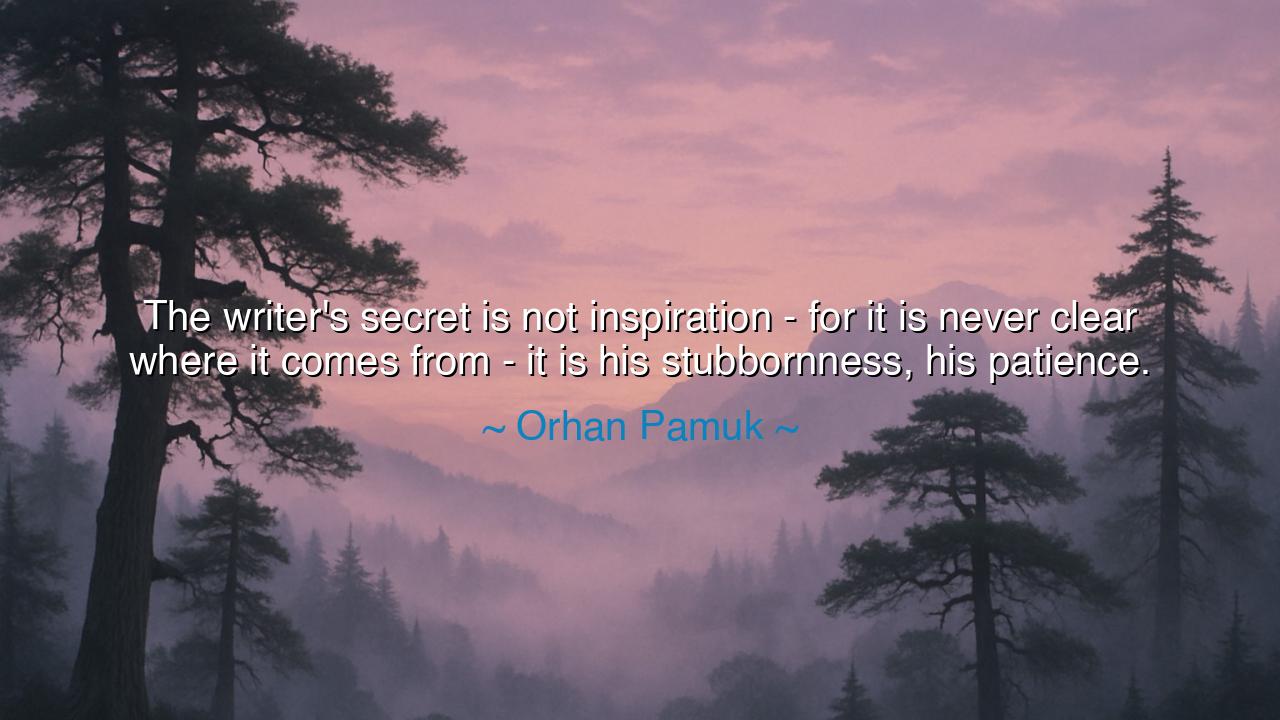
The writer's secret is not inspiration - for it is never clear
The writer's secret is not inspiration - for it is never clear where it comes from - it is his stubbornness, his patience.






Hear the words of Orhan Pamuk, Nobel laureate and keeper of stories: “The writer’s secret is not inspiration—for it is never clear where it comes from—it is his stubbornness, his patience.” In this confession lies a truth that defies the illusions of the world. For many imagine the writer as a vessel of divine fire, struck suddenly by the lightning of inspiration. They believe that words pour forth in a flood of genius, unbidden and effortless. But Pamuk, who has lived long at the desk, tells us the greater secret: that the true power is not in sudden flashes, but in the unyielding persistence to remain, to endure, to labor patiently through silence until the words emerge.
Inspiration is a mystery, a shadow that comes and goes without warning. It cannot be commanded, it cannot be trapped. It may arrive in a dream, in a walk, in the voice of another—but it is as fleeting as wind. To rely only on it is to starve. The true writer, says Pamuk, does not wait passively for the fire. He embraces stubbornness, returning to the page day after day, even when the flame is absent. He knows that patience, like water dripping on stone, shapes the words slowly, until they flow into meaning.
History itself proves this. Consider Leo Tolstoy, who spent years shaping War and Peace. He did not write it in a single rush of genius, but through long seasons of revision, correction, and the slow patience of rewriting. Inspiration may have given him the vision, but it was stubbornness and patience that built the monumental work. Without endurance, even the brightest flash of genius would have faded, leaving nothing but fragments.
Think also of Michelangelo, whose brush touched the ceiling of the Sistine Chapel. Visitors gasp at its beauty, imagining the artist struck by heaven itself. Yet behind that vision were years of backbreaking labor, months of frustration, days of solitude where inspiration was silent. He endured the pain of scaffolding, the strain of detail, the exhaustion of repetition. What sustained him was not inspiration alone, but stubbornness and patience, the same virtues that Pamuk names as the secret of every creator.
The meaning of this quote reaches beyond writing. In every craft, in every pursuit, the illusion of inspiration deceives us. The scientist who labors at experiments, the athlete who trains daily, the farmer who tends the soil—all are sustained not by flashes of divine brilliance, but by endurance. True creation comes not in moments of lightning, but in the steady fire of persistence. Patience is the mother of all mastery, and stubbornness its loyal companion.
The lesson is clear: do not worship inspiration as your master. Welcome it when it comes, but do not depend on it. Instead, train your spirit in stubbornness, that you may continue when your heart is weary. Train your soul in patience, that you may endure when progress seems slow. Know that greatness is not in waiting for the perfect moment, but in creating faithfully in imperfect hours.
Practical wisdom lies before you: Sit at your task daily, whether words come or not. Shape a rhythm, for rhythm builds strength. When despair whispers that nothing is happening, trust that unseen roots are deepening. When inspiration finally descends, it will find you prepared, your tools ready, your spirit strong. And if it delays, you will still be building, patiently, stubbornly, laying stone upon stone until a monument rises.
So let Orhan Pamuk’s words echo in your soul: The writer’s secret is not inspiration—it is stubbornness, it is patience. May this truth guide not only writers, but all who labor toward greatness. For in the end, inspiration is the spark, but stubborn patience is the fire that keeps burning long after the spark has gone.






AAdministratorAdministrator
Welcome, honored guests. Please leave a comment, we will respond soon